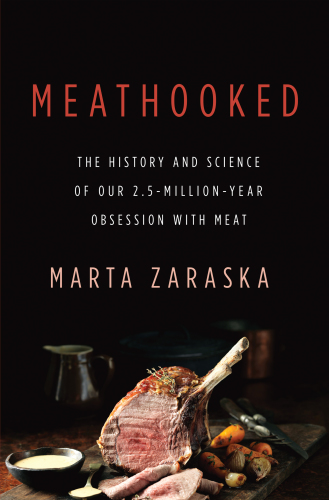
Meathooked
The History and Science of Our 2.5-Million-Year Obsession with Meat
کتاب های مرتبط
- اطلاعات
- نقد و بررسی
- دیدگاه کاربران
نقد و بررسی

November 15, 2015
With an open mind, a vegetarian journalist examines our "love affair with meat." Zaraska cites evidence that vegetarians live longer and familiar statistics showing a correlation between meat consumption and cancer, diabetes, and heart disease. She also shares findings that raising domestic animals contributes greatly to global warming. "Producing one calorie from animal protein releases eleven times more carbon dioxide than producing one calorie from plants," she writes. "Meat is responsible for up to 22 percent of all greenhouse gases--by comparison aviation contributes a mere 2 percent." Nonetheless, Zaraska admits to the appeal of meat, which she herself eats on occasion. Moreover, she recognizes that meat eating played an important role in the development of our species, encouraging the invention of sophisticated tools and social organization that allowed early humans to seize the prey of other carnivores as well as killing them ourselves. It also encouraged a migratory lifestyle, and eating meat gave us the extra energy to grow our brains. On the other hand, the author convincingly debunks outsized claims for the value of a high-protein diet. Zaraska examines our attraction to meat, which she explains is richly endowed with umami (the Japanese word for delicious). It is a taste shared with tomatoes and the seasoning monosodium glutamate, as well as meat, and it is now considered a basic taste along with salty, sweet, sour, and bitter (for all of which we have taste receptors). Despite the appeal of taste, the author also finds social and economic factors--e.g. government subsidies to grain producers that lower the cost of animal feed--and the prestige of Western lifestyles in countries such as China. Ultimately, she predicts a global shift to a preponderantly vegetarian diet. A well-researched, refreshingly optimistic look at a serious issue, free of ideological preconceptions.
COPYRIGHT(2015) Kirkus Reviews, ALL RIGHTS RESERVED.

February 15, 2016
The economics of meat consumption cannot be ignored. Raising and eating animals has a profound effect on the environment, the global economy, and human health. But even knowing what we know, it seems impossible that humans will go vegetarian any time soonit simply has too great a hold on us. We seem to be hardwired to want meat. After all, even fake meat exists, which seems oddthere are no nut substitutes for those with allergies, for example. Science reporter Zaraska wanted to know why meat is so important to eaters, and her book takes an informative look at the politics of meat, touching on how the treatment of animals has a huge effect on the taste and quality of their meat; exposing how the meat industry uses millions to advertise and lobby; and delving into why Americans do not eat dogs or horses (early Christian zealots deemed horse-eating barbaric). Zaraska's book certainly isn't the first to take a look at the subjectsee Fast Food Nation (2002) or Meatonomics (2013)but this slim volume features an engaging narrative that is easy to digest.(Reprinted with permission of Booklist, copyright 2016, American Library Association.)

























دیدگاه کاربران